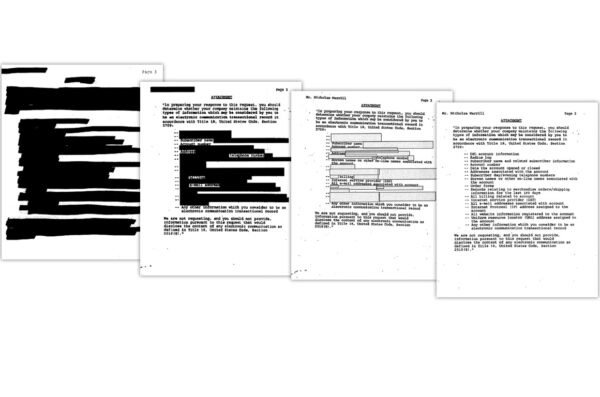National Security Letter Recipient Can Speak Out For First Time Since FBI Demanded Customer Records From Him

FBI Partially Lifts Gag Order In ACLU Case
FOR IMMEDIATE RELEASE
CONTACT: (212) 549-2666; media@aclu.org
NEW YORK – The FBI has partially lifted a gag it imposed on American Civil Liberties Union client Nicholas Merrill in 2004 that prevented him from disclosing to anyone that he received a national security letter (NSL) demanding private customer records. Merrill, who received the NSL as the president of an Internet service provider (ISP), can now reveal his identity and speak about his experience for the first time since receiving the NSL. The ACLU and New York Civil Liberties Union filed a lawsuit challenging the NSL statute and the gag order on behalf of Merrill (then called John Doe) in April 2004, which resulted in numerous court rulings finding the NSL statute unconstitutional. Merrill was the first person ever to challenge an NSL in court.
"After six long years of not being able to tell anyone at all what happened to me – not even my family – I'm grateful to finally be able to talk about my experience of being served with a national security letter," said Merrill. "Internet users do not give up their privacy rights when they log on, and the FBI should not have the power to secretly demand that ISPs turn over constitutionally protected information about their users without a court order. I hope my successful challenge to the FBI's NSL gag power will empower others who may have received NSLs to speak out."
NSLs are secret record demands the FBI issues to obtain access to personal customer records from ISPs, libraries, financial institutions and credit reporting agencies without court approval or even suspicion of wrongdoing. Because the FBI can gag NSL recipients to prohibit them from disclosing anything about the record demands they receive, the FBI's use and potential abuse of the NSL power has been shrouded in excessive secrecy. While the NSL served on Merrill stated that he was prohibited from telling anyone about it, he decided to challenge the demand in court because he believed that the FBI was ordering him to turn over constitutionally protected information about one of his clients. Because of the FBI-imposed gag, Merrill was prohibited from talking about the NSL or revealing his identity and role in the lawsuit until today, even though the FBI abandoned its demand for records from Merrill more than three years ago.
In December 2008, the Second Circuit Court of Appeals, ruling in Merrill's case, found that some of the NSL statute's gag provisions were unconstitutional because they wrongly placed the burden on NSL recipients to challenge gag orders, narrowly limited judicial review of gag orders and required courts to defer entirely to the executive branch. The appeals court sent the case back to the U.S. District Court for the Southern District of New York and ordered the government to justify the constitutionality of the gag on Merrill. On July 30, the parties reached a settlement in the case. As part of that settlement, the FBI agreed that Merrill could now identify himself as the John Doe NSL recipient.
"We are thrilled that Nick will finally be able to speak out about why he took the courageous step of challenging the FBI's NSL power. Thanks to Nick's actions, courts have now recognized the need for judicial oversight of the government's dangerous NSL gag power," said Melissa Goodman, staff attorney with the ACLU National Security Project. "But even though this case has resulted in significant improvements to NSL procedures, innocent Americans' private records remain too vulnerable to secret and warrantless data collection by the FBI. At a minimum, the FBI should have to show individual suspicion before it issues an NSL for an individual's personal information and invades Americans' right to privacy and free speech on the Internet."
While misuse and abuse of the NSL power has been widely documented, the Obama administration is now seeking to expand the statute to allow the FBI to demand even more records without court approval. In July, the Obama administration proposed to expand the statute to allow the FBI to get Americans' Internet activity records without court approval or even suspicion of wrongdoing.
In 2009, Congressmen Jerrold Nadler (D-NY) and Jeff Flake (R-AZ) reintroduced the National Security Letters Reform Act, aimed at reigning in abuse of the power. The ACLU has called on Congress to reform the remaining constitutional defects of the NSL gag power and reject Obama proposals to expand the NSL statute.
In addition to Goodman, attorneys on the case are Jameel Jaffer of the national ACLU and Arthur Eisenberg of the NYCLU.
More information about the case is available online at: www.aclu.org/national-security/doe-v-holder




